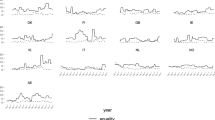Abstract
An increasing number of families are forced to migrate as a result of political turmoil, civil wars, and “ethnic cleansing”. This paper describes the impact of forced migration on individuals and their families. We suggest that forced migrants reject the new culture while their children are likely to embrace it. This discrepancy between the “old” values of the migrants and the values to the new culture espoused by their children is a frequent source of intrafamilial tension. We also describe a second acculturation process that takes place when forced migrants return to their country of origin. Families who migrate back to the country of origin realize, often to their surprise, that both they and their country of origin have changed significantly.
Similar content being viewed by others
References
Aroian, K. J. (1990). A model of psychological adaptation to migration and resettlement.Nursing Research, 39, 5–10.
Berry, J. W. (1980). Acculturation as varieties of adaptation. In A. M. Padilla (Ed.),Acculturation: Theory, model, and some new findings (pp. 9–26). Boulder, CO: Westview Press.
Guthrie, G. M. (1975). A behavioral analysis of culture learning. In R. W. Brislin, S. Bocher, & W. J. Looner (Eds.),Cross cultural perspectives on learning (pp. 95–115). New York: Wiley.
Maureira, G., & Del Rio, M. T. (July 1993).Observaction sobre la dinamica familiar de lost retornados al pais. 25 Congreso Iberoamericano de Psicologia (Observations regarding the dynamics of families who returned to their country. 25th Ibero-American congress of psychology). Santiago, Chile.
Padilla, A. M. (1980). The role of cultural awareness and ethnic loyalty in acculturation. In A. M. Padilla (Ed.)Acculturation: Theory, model, and some new findings (pp. 47–84). Boulder, CO: Westview Press.
Sluzki, C. E. (1990). Disappeared: Semantic and somatic effects of political repression in a family seeking therapy.Family Process, 29, 131–143.
Sluzki, C. E. (1992). Disruptions and reconstruction of networks following migration/relocation.Family Systems Medicine, 10, 359–363.
Sluzki, C. E. (1993). Toward a model of family and political victimization: Implications for treatment and recovery.Psychiatry: Interpersonal and Biological Processes, 56, 178–187.
Author information
Authors and Affiliations
Rights and permissions
About this article
Cite this article
Roizblatt, A., Pilowsky, D. Forced migration and resettlement: Its impact on families and individuals. Contemp Fam Ther 18, 513–521 (1996). https://doi.org/10.1007/BF02195714
Issue Date:
DOI: https://doi.org/10.1007/BF02195714




